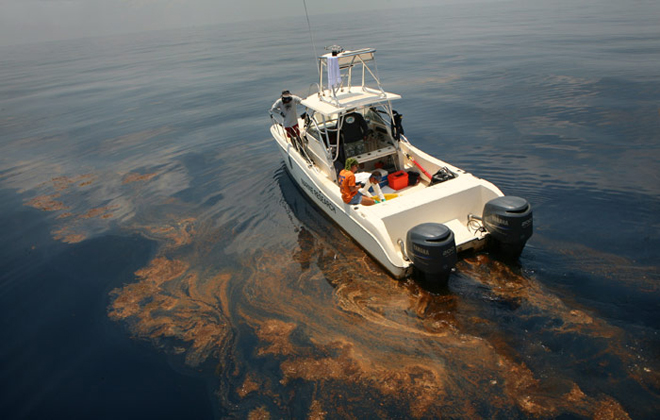Updated January 25, 2012 at 11:29 am.
A former employee of BP America is suing the oil company for wrongful termination, alleging that he was canned for refusing to alter data about the progress of the clean-up of the Deepwater Horizon oil spill.
In a suit filed in U.S. District Court in Louisiana, August Walter asks for damages over his termination from BP, where he was employed for about a year as part of the Gulf Coast clean-up. Walter served under BP’s Gulf Coast Restoration Organization (GCRO) as State Planning Lead “for the purpose of developing a descriptive plan to accomplish the cleaning of oil caused by the BP spill.”
BP America has been running a clean-up operation since the Deepwater Horizon oil rig exploded in April, 2010, killing 11 workers and dumping 4.9 million barrels of oil into the Gulf. The spill affected the coasts of Louisiana, Mississippi, Florida and Alabama.
According to the suit, Walter’s job involved creating plans for the clean-up, known as Shoreline Treatment Recommendations (STR), which were prepared and approved with the oversight of the U.S. Coast Guard Federal On-Scene Coordinator (FOSC) “to be in compliance with federal and state environmental rules and regulations.” BP would then be responsible for implementing the plans.
But, Walter claims, in May and June of 2011 he “began to convey his concerns that BP Mississippi operations were intentionally not following the plans for clean up delineated by U.S. Government, the Coast Guard and the Department of the Interior.”
“Cory Brown, BP’s Deputy Operations Branch Director/Response Lead conveyed that he was defying the [recommendations] by insisting that BP was only picking up tar balls and not other smaller oil debris as required by the” Shoreline Treatment Recommendations. In September of last year, Walter told BP that he was required to inform stakeholders that the company was not following his recommendations.
Shortly after, Walter claims that “BP began a malicious campaign to discredit him in retaliation for his opposition to BP refusal to reasonably follow environmental rules and regulations.” At one point, Walter says, he was called in for a meeting with the VP of Operations who said that the “focus was to have the [Coast Guard] be confident in BP” so that they could more quickly transition to a new plan for clean-up and oversight that would be beneficial to BP stock prices. Walter claims he was “specifically threatened” and told that there were “people watching him” that would report him if he continued to hinder BP’s plans.
Walter also claims that following a Deep Dive to assess the clean-up’s progress, BP’s Operations Section Chief Mike Harrison said he “did not like the data as to Mississippi because as he stated ‘it did not fit with the story’ he wanted to tell” the Coast Guard. “[Harrison] specifically — without back-up data — insisted that the amount of segments that needed to be cleaned had to be lower than the data was showing.”
“Mike Harrison basically demanded that Walter falsify the data by changing the number of segments that still needed to be cleaned to a lower number,” the suit alleges.
In November, Walter was put on administrative leave pending investigation, and officially terminated on December 9, which he believes was in “retaliation’ for his refusal to skew the data.
Tom Mueller, the Press officer for BP America Houston denied the allegations in an e-mail statement:
We do not believe that Mr. Walter’s allegations have merit. We will investigate the allegations contained in his complaint, consistent with our personnel policies and Code of Conduct. We believe we have demonstrated good faith in meeting our obligations in the Gulf and are committed to treating our employees fairly.
In the suits, Walter says he is protected under the Louisiana Environmental Whistleblower Statute, which states that “no firm, business, private or public corporation, partnership, individual employer, or federal, state, or local governmental agency shall act in a retaliatory manner against an employee, acting in good faith,” who “discloses, or threatens to disclose, to a supervisor or to a public body an activity, policy, practice of the employer, or another employer with whom there is a business relationship, that the employee reasonably believes is in violation of an environmental law, rule, or regulation.”
Wilson asks the court for “injunctive and equitable relief, back pay, reinstatement (or in lieu thereof, front pay), compensatory damages, treble damages, attorney’s fees, prejudgment interest, and costs for violations based on The Louisiana Environmental Whistleblower Statute.”
h/t Courthouse News.






